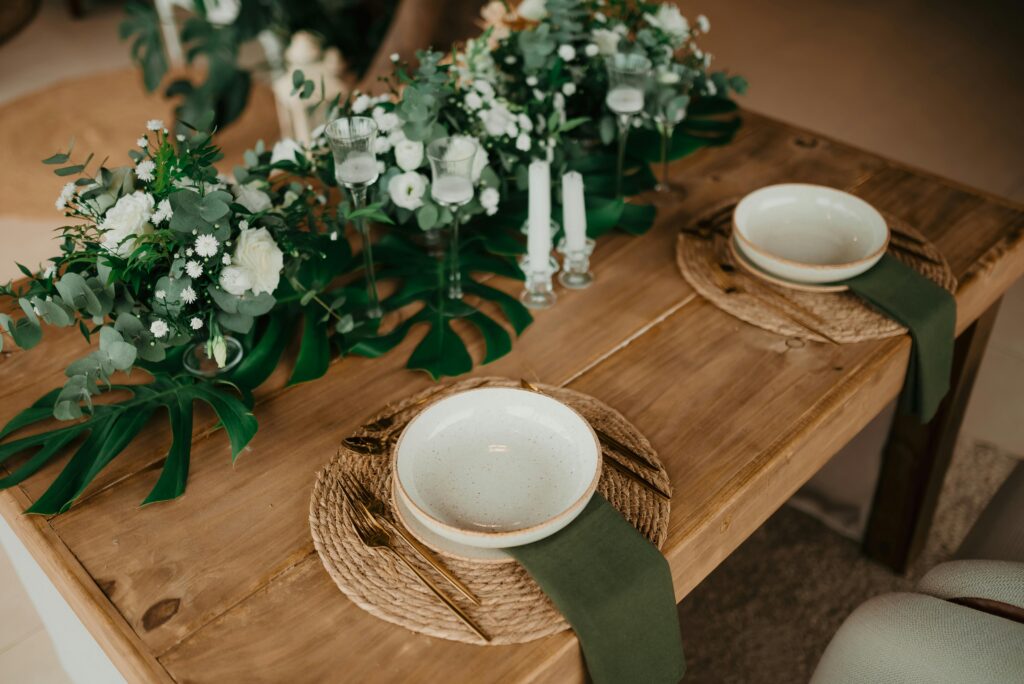As an event planner or host, you have the power to create unforgettable experiences that not only delight your guests but also contribute to a healthier planet through eco-friendly events. Looks like a big deal? No, it is not. The key to a successful, sustainable event is in the decisions made throughout the planning process. All it takes is thoughtful, eco-conscious planning to minimise environmental impacts while creating memorable eco-friendly events. Whether it’s minimising waste, reducing energy use, or promoting sustainable practices, every action counts toward a greener event. Here are some sustainable practical tips and strategies to make your next event a sustainable success.
1. Sustainable Venue Selection:
When planning eco-friendly events, venue selection plays a crucial role in setting the foundation for sustainability. The first thing you want to do is to opt for venues that are LEED-certified or use renewable energy sources. Look for venues with energy-efficient lighting, heating, and cooling systems. Choose a venue that’s close to public transportation, or encourage attendees to walk, bike, or carpool to reduce carbon emissions. Also, prioritize local venues to reduce the environmental footprint associated with transportation for both guests and materials. In addition, plan outdoor or daytime events to take advantage of natural light and reduce the need for artificial lighting.
2. Reduce Event Waste:
-Go Paperless: Digital invitations, e-tickets, and mobile apps for event schedules help cut down on paper waste. Use QR codes for event guides and maps. Eventbrite is a global e-ticket and digital invitation you can try out for your event.
-Reusable or Compostable Materials: If physical items are necessary, opt for materials that are reusable (like cloth napkins, tableware) or compostable (such as bamboo cutlery). When it comes to eco-friendly take away packaging, Kraft paper food packaging might be a top choice.
-Waste Sorting: Provide clearly marked recycling and composting stations, ensuring guests can easily dispose of waste in an environmentally friendly way.
3. Eco-Friendly Catering: Food choices impact the carbon footprint of eco-friendly events, making sustainable catering a priority.
-Locally Sourced & Seasonal: Work with caterers who use locally sourced, seasonal ingredients. This minimises the carbon footprint associated with transportation.
-Plant-Based Menus: For the menu incorporate plant-based or vegetarian options, which generally have a lower environmental impact compared to meat-based dishes.
-Zero-Waste Catering: Choose caterers that minimise food waste by offering portion control options or donating leftovers to local charities.
4. Sustainable Event Materials:
-Sustainable Decorations: Choose decorations made from recyclable or biodegradable materials like paper, wood, or fabric. Reuse items from previous events when possible.
-Eco-Friendly gifts: If you’re providing gifts or swag, choose sustainable products such as reusable water bottles, tote bags, or plant-based items. Avoid single-use plastics.
-Limit Printed Materials: Reduce printed brochures or programs by offering digital versions.

5. Transportation & Travel:
-Encourage Sustainable Transportation: Promote the use of public transport, ride-sharing apps, or bike rentals for attendees. Provide incentives for those who carpool or use eco-friendly methods of travel.
-Carbon Offsets: For larger events that require travel, consider partnering with carbon offset programs to neutralise emissions from flights or long-distance travel. You can partner with Event transportation system to provide sustainable transportation for your guests.
6. Communication & Awareness: Clear communication about sustainability initiatives helps attendees understand their role in making eco-friendly events successful.
-Inform Attendees: Let attendees know about your eco-friendly initiatives in advance. Educate them on how they can contribute, such as by bringing reusable water bottles or using public transport.
-Eco-Friendly Event Apps: Use an event app to share updates, event information, and promote green initiatives, minimizing the need for physical signage.
7. Sustainable Event Partners:
-Eco-Conscious Vendors: Collaborate with vendors and suppliers that have sustainable business practices. From caterers to florists, working with eco-conscious partners helps strengthen your event’s sustainability efforts.
-Local Suppliers: Prioritize working with local vendors to reduce the environmental impact of transportation and support the local economy.
8. Post-Event Sustainability:
-Reuse & Repurpose: After the event, donate leftover materials like decor or supplies to local charities, schools, or community organizations.
-Evaluate & Improve: Conduct a sustainability audit after the event and gather feedback from guests on eco-friendly practices. Use the findings to improve future events.
Planning an eco-friendly event is about making thoughtful choices that reduce environmental impact while still creating an engaging and memorable experience for attendees. By prioritising sustainability and climate friendly events, you can contribute to a greener future, set an example for others, and build a brand that aligns with the values of eco-consciousness.
By following these tips and strategies, your next event will not only leave a lasting impression but also a positive legacy for the environment.
Avoiding Fast Fashion: How to Get a More Sustainable Wardrobe











